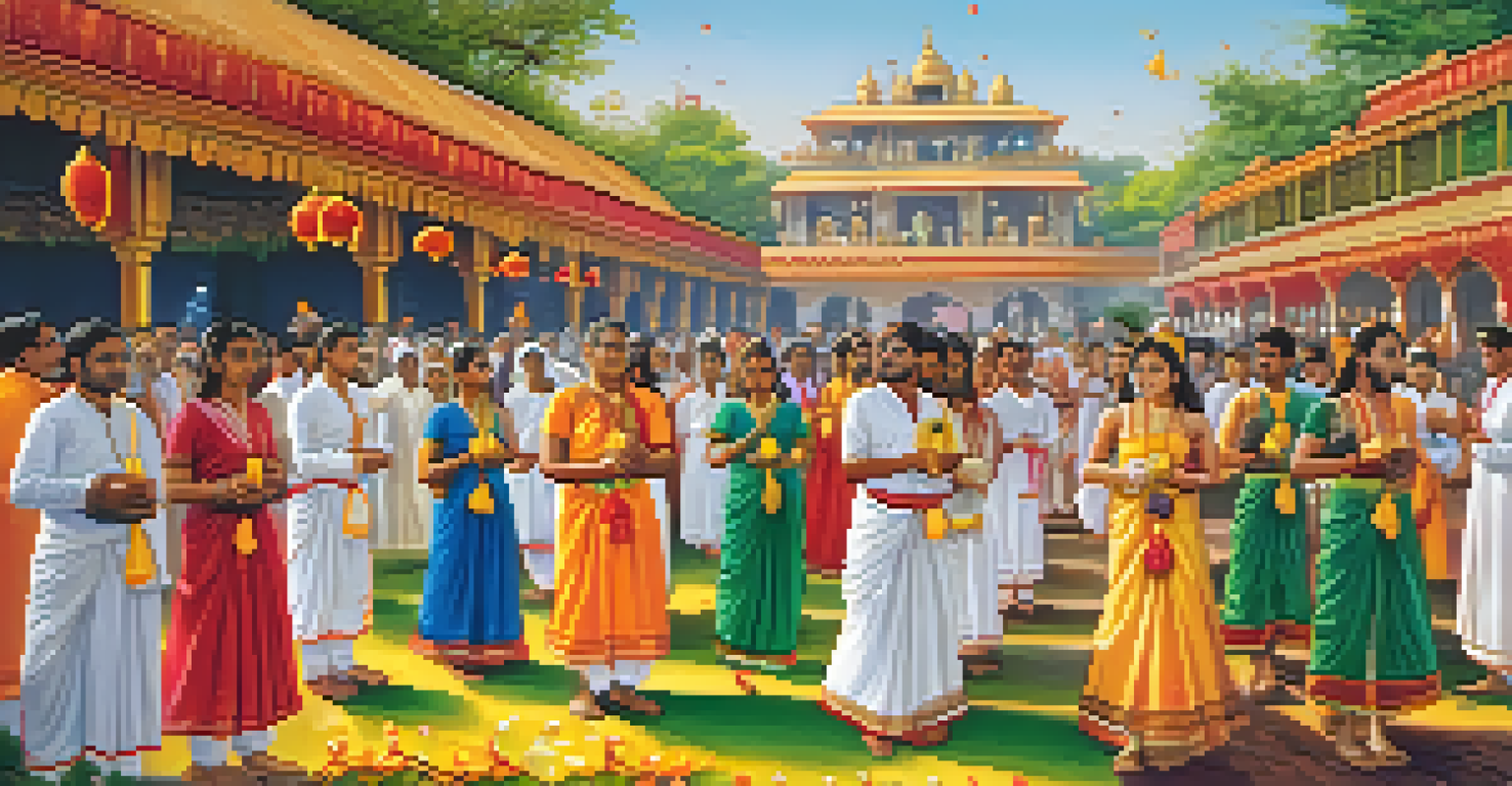The Intersection of Time and Spirituality in Jainism

Understanding Time in Jain Philosophy
In Jainism, time is viewed as cyclical rather than linear, contrasting with many Western beliefs. This cyclical nature reflects the Jain perspective that time consists of endless cycles of creation and destruction, known as 'kalachakra.' Understanding this concept can help practitioners accept the transient nature of life and existence.
Time is what we want most, but what we use worst.
The Jains categorize time into two main periods: the ascending 'utsarpini' and the descending 'avasarpini.' During utsarpini, the world is believed to improve, while in avasarpini, it declines. This cyclical view encourages individuals to be mindful of their actions and their consequences over time, fostering a sense of responsibility.
Moreover, Jains believe that spiritual progress can aid individuals in transcending time altogether. Achieving liberation ('moksha') is seen as breaking free from the cycle of rebirth, allowing the soul to exist beyond time and space, a deeply spiritual aspiration for many.
The Role of Time in Jain Rituals and Practices
Time plays a crucial role in the rituals and practices of Jainism, influencing everything from daily prayers to major festivals. Jains often perform rituals at specific times, aligning with auspicious moments that reflect their understanding of time's cyclical nature. This practice emphasizes the importance of being present and mindful in spiritual activities.

Festivals like Paryushana highlight the significance of time in Jain spiritual life. During this period, Jains engage in heightened self-discipline, reflection, and community gatherings, marking a sacred time for spiritual growth. Such observances underscore the idea that time is not merely a measure but a valuable opportunity for spiritual development.
Time is Cyclical in Jainism
Jain philosophy views time as cyclical, consisting of endless cycles of creation and destruction, which encourages mindfulness and responsibility.
Furthermore, the timing of rituals often reflects the belief in karma's influence on temporal experiences. By performing rituals at the right moments, Jains seek to create positive karmic outcomes, reinforcing the connection between their actions and the unfolding of time.
Meditation and Mindfulness: Bridging Time and Spirituality
Meditation is a cornerstone of Jain spirituality, where the concept of time takes on a profound significance. Jains practice meditation to cultivate awareness of the present moment, allowing them to transcend the distractions of past regrets and future anxieties. This practice embodies the belief that spiritual growth happens in the now.
The present moment is filled with joy and happiness. If you are attentive, you will see it.
The art of mindfulness in Jainism encourages individuals to reflect on their thoughts and actions without judgment, fostering an inner peace that aligns with their spiritual goals. By focusing on the present, practitioners can better understand the impermanence of life, enhancing their appreciation for the time they have.
Through meditation, Jains aim to connect with their inner selves and the universe, transcending the confines of time. This deeper understanding promotes a sense of unity with all beings, reinforcing the idea that spirituality and time are intricately connected in the journey toward liberation.
The Concept of Karma and Its Temporal Implications
Karma is a central tenet in Jainism, directly influencing how time is perceived and experienced. Jains believe that every action creates a karmic effect that can manifest in this lifetime or future lives, intertwining the essence of time with moral responsibility. This belief encourages individuals to live ethically, aware of the far-reaching impacts of their choices.
The notion that karma influences future rebirths adds a temporal dimension to spiritual practice. Jains strive to accumulate good karma through right actions, thus shaping their future experiences and spiritual progress. This perspective reinforces a proactive approach to life, where every moment is seen as an opportunity to improve one's karmic footprint.
Karma Shapes Temporal Experiences
In Jainism, every action creates a karmic effect that influences future experiences, intertwining ethical living with temporal understanding.
Ultimately, understanding karma in relation to time empowers Jains to take charge of their spiritual journey. By recognizing that their present actions will ripple through time, they are motivated to engage in practices that foster peace, compassion, and non-violence.
Eternal Time: Jainism's View on the Universe
Jain cosmology presents a fascinating perspective on time, viewing the universe as eternal, without a definitive beginning or end. This contrasts sharply with many religious narratives that describe a creation event. Jains believe that the universe undergoes perpetual cycles, which feeds into their understanding of existence and spirituality.
In Jain philosophy, the universe is divided into three realms: the upper, the middle, and the lower. Each realm has its own temporal dynamics and is inhabited by different beings. This detailed cosmological framework reinforces the idea that time is ever-present and influences all aspects of spiritual life.
Moreover, Jains conceive of time not just as a backdrop for events but as an active participant in the unfolding of spiritual evolution. The eternal nature of the universe instills a sense of awe and humility, encouraging adherents to reflect on their place within this vast tapestry.
Spiritual Liberation: Transcending Time in Jain Beliefs
Achieving spiritual liberation, or moksha, is the ultimate goal in Jainism, where time ceases to hold sway over the soul. This belief underscores a profound understanding that true freedom lies in transcending temporal limitations. For Jains, liberation represents a state of eternal bliss, free from the cycles of birth and death.
The path to moksha involves rigorous self-discipline, ethical living, and spiritual practices that purify the soul. As one progresses on this journey, the grip of time loosens, allowing individuals to experience moments of timelessness during deep meditation. These moments serve as a glimpse into the eternal nature of the soul.
Moksha Transcends Temporal Limits
Achieving spiritual liberation (moksha) allows individuals to break free from the constraints of time, representing a state of eternal bliss.
Ultimately, the Jain belief in transcending time reflects their profound commitment to spiritual growth. By striving for liberation, practitioners aim to break free from the chains of temporal existence, achieving a state of peace that is both timeless and universal.
The Interconnection of Time, Ethics, and Spirituality
In Jainism, the interplay between time, ethics, and spirituality is fundamental to understanding the faith. Ethical living is not just about following rules; it's about recognizing how one's actions resonate through time and impact the larger universe. This awareness fosters a deep sense of responsibility among practitioners.
Jains are encouraged to practice non-violence (ahimsa) and truthfulness (satya) not only for immediate benefits but also for their long-term karmic implications. By living ethically, practitioners contribute to a more harmonious world, which in turn affects their spiritual journey over time.

This ethical framework creates a moral compass that guides Jains in navigating life's complexities. As they align their actions with their spiritual beliefs, they cultivate a deeper connection to both time and the universe, enriching their spiritual experience.